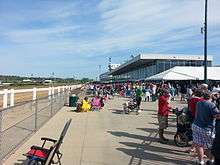Fairmount Park Racetrack
Fairmount Park Racetrack is a horse racing track in Collinsville, Illinois, a part of the St. Louis metropolitan area. The track hosts Thoroughbred flat racing. It is one of three horse racing venues currently active in Illinois, and the only one outside the Chicago, Illinois metro area. The track also featured Standardbred harness racing, but discontinued it in 1999.[1]


| Horse Race Track | |
|---|---|
| Fairmount Park | |
| Location | Collinsville, Illinois |
| Date opened | 1925 |
| Race type | Thoroughbred (current), harness (through 1999) |
| Website | Fairmount Park web site |
| Principal Races | |
| St. Louis Derby (no longer run) | |
The track opened in 1925. The racing surface is a one-mile (1.6 km) dirt oval, with straight chutes for six furlong and 1¼ mile races.
Ogden Corporation bought the track in 1969.[2] In 2000, Ogden sold the track to Bill Stiritz, then the chairman of Ralston Purina.[3]
Fairmount Park offers simulcast wagering from tracks throughout the country. It also operates four off-track betting facilities in Alton, Carbondale, Springfield and Sauget, Illinois; a fifth OTB facility in Grayville, Illinois closed in early 2007.
As recently as 1997, Fairmount Park offered as many as 232 live racing days per year. But in recent years, the track has suffered greatly with the advent of riverboat casinos in the St. Louis metropolitan area. Racing dates have declined to 90 per year, on Tuesdays, Fridays and Saturdays.
In 2007, track management announced a plan to build a 20,000-seat amphitheater at the track and expand live racing (including the reinstatement of harness racing), pending approval by state lawmakers to allow slot machines to be installed, similar to racinos in nearby locations.[4] When the legislature did not approve slots in its regular session, Fairmount management applied to the Illinois Racing Board for 90 days of live racing, but said that if lawmakers did not approve relief for horse tracks in its November veto session, the track would only run 60 days, citing declining attendance and betting handle, competition from casinos, and overpayment of the horsemen's account for purses.[5] The track's general manager claimed that purses at the track were less than half that of similar tracks in neighboring Kentucky and Indiana. The request was granted with those conditions intact.[1][6][7]
References
- Buss, Will (2007-09-21). "Racing board grants Fairmount Park request; schedule might not be cut". Belleville News-Democrat.
- Owner Of Waterford Selling Out
- New Owner For Fairmount Park
- "Fairmount Pushes for Slots". OddsOnRacing.com. 2007-05-07.
- Roberts, Ken (2007-09-18). "Fairmount Park considers a shorter season". St. Louis Post-Dispatch. Archived from the original on 2013-02-03.
- Buss, Will (2007-09-18). "Fairmount Park pushes for season that lasts 90 days". Belleville News-Democrat.
- Graber, Shane (2007-09-24). "Fairmount Park: 'Everybody's worried'". St. Louis Post-Dispatch.